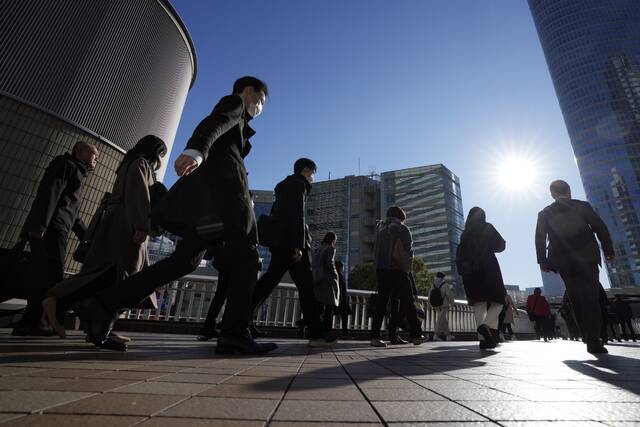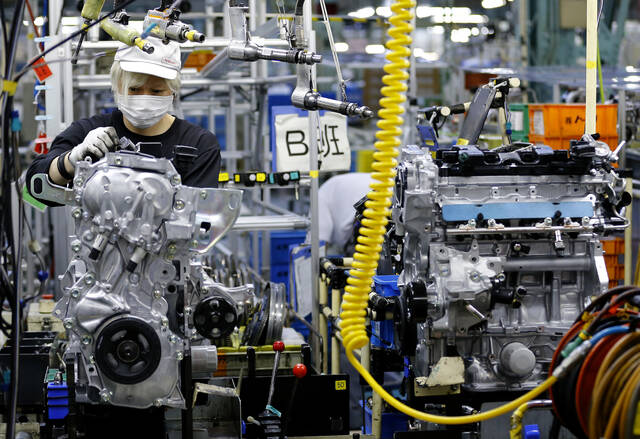TOKYO — Japan, a nation so hardworking its language has a term for literally working oneself to death, is trying to address a worrisome labor shortage by coaxing more people and companies to adopt four-day workweeks.
The Japanese government first expressed support for a shorter working week in 2021, after lawmakers endorsed the idea. The concept has been slow to catch on, however; about 8% of companies in Japan allow employees to take three or more days off per week, while 7% give their workers the legally mandated one day off, according to the Ministry of Health, Labor and Welfare.
Hoping to produce more takers, especially among small and medium-sized businesses, the government launched a “work style reform” campaign that promotes shorter hours and other flexible arrangements along with overtime limits and paid annual leave. The labor ministry recently started offering free consulting, grants and a growing library of success stories as further motivation.
“By realizing a society in which workers can choose from a variety of working styles based on their circumstances, we aim to create a virtuous cycle of growth and distribution and enable each and every worker to have a better outlook for the future,” states a ministry website about the “hatarakikata kaikaku” campaign, which translates to “innovating how we work.”
The department overseeing the new support services for businesses says only three companies have come forward so far to request advice on making changes, relevant regulations and available subsidies, illustrating the challenges the initiative faces.
Perhaps more telling: of the 63,000 Panasonic Holdings Corp. employees who are eligible for four-day schedules at the electronics maker and its group companies in Japan, only 150 employees have opted to take them, according to Yohei Mori, who oversees the initiative at one Panasonic company.
The government’s official backing of a better work-life balance represents a marked change in Japan, a country whose reputed culture of workaholic stoicism often got credited for the national recovery and stellar economic growth after World War II.
Conformist pressures to sacrifice for one’s company are intense. Citizens typically take vacations at the same time of year as their colleagues — during the Bon holidays in the summer and around New Year’s — so co-workers can’t accuse them of being neglectful or uncaring.
Long hours are the norm. Although 85% of employers report giving their workers two days off a week and there are legal restrictions on overtime hours, which are negotiated with labor unions and detailed in contracts. But some Japanese do “service overtime,” meaning it’s unreported and performed without compensation.
A recent government white paper on “karoshi,” the Japanese term that in English means “death from overwork, said Japan has at least 54 such fatalities a year, including from heart attacks.
Japan’s “serious, conscientious and hard-working” people tend to value their relationships with their colleagues and form a bond with their companies, and Japanese TV shows and manga comics often focus on the workplace, said Tim Craig, the author of a book called “Cool Japan: Case Studies from Japan’s Cultural and Creative Industries.”
“Work is a big deal here. It’s not just a way to make money, although it is that, too,” said Craig, who previously taught at Doshisha Business School and founded editing and translation firm BlueSky Academic Services.
Some officials consider changing that mindset as crucial to maintaining a viable workforce amid Japan’s nosediving birth rate. At the current rate, which is partly attributed to the country’s job-focused culture, the working age population is expected to decline 40% to 45 million people in 2065, from the current 74 million, according to government data.
Proponents of the three-days-off model say it encourages people raising children, those caring for older relatives, retirees living on pensions and others looking for flexibility or additional income to remain in the workforce for longer.
Akiko Yokohama, who works at Spelldata, a small Tokyo-based technology company that allows employees to work a four-day schedule, takes Wednesdays off along with Saturdays and Sundays. The extra day off allows her to get her hair done, attend other appointments or go shopping.
“It’s hard when you aren’t feeling well to keep going for five days in a row. The rest allows you to recover or go see the doctor. Emotionally, it’s less stressful,” Yokohama said.
Her husband, a real estate broker, also gets Wednesdays off but works weekends, which is common in his industry. Yokohama said that allows the couple to go on midweek family outings with their elementary-school age child.
Fast Retailing Co., the Japanese company that owns Uniqlo, Theory, J Brand and other clothing brands, pharmaceutical company Shionogi & Co., and electronics companies Ricoh Co. and Hitachi also began offering a four-day workweek in recent years.
The trend even has gained traction in the notoriously consuming finance industry. Brokerage SMBC Nikko Securities Inc. started letting workers put in four days a week in 2020. Banking giant Mizuho Financial Group offers a three-day schedule option.
Critics of the government’s push say that in practice, people put on four-day schedules often end up working just as hard for less pay.
But there are signs of change.
A annual Gallup survey that measures employee engagement ranked Japan as having among the least engaged workers of all nationalities surveyed; in the most recent survey, only 6% of the Japanese respondents described themselves as engaged at work compared to the global average of 23%.
That means relatively few Japanese workers felt highly involved in their workplace and enthusiastic about their work, while most were putting in their hours without investing passion or energy.
Kanako Ogino, president of Tokyo-based NS Group, thinks offering flexible hours is a must for filling jobs in the service industry, where women comprise most of the work force. The company, which operates karaoke venues and hotels, offers 30 different scheduling patterns, including a four-day workweek, but also taking long periods off in between work.
To ensure none of the NS Group’s workers feel penalized for choosing an alternative schedule, Ogino asks each of her 4,000 employees twice a year how they want to work. Asserting individual needs can be frowned upon in Japan, where you are expected to sacrifice for the common good.
“The view in Japan was: You are cool the more hours you work, putting in free overtime,” Ogino said with a laugh. “But there is no dream in such a life.”















